 Petzlover
Petzlover Gull Terr is originated from Pakistan but Tea Cup Chihuahua is originated from Mexico. Gull Terr may grow 28 cm / 12 inches higher than Tea Cup Chihuahua. Gull Terr may weigh 42 kg / 93 pounds more than Tea Cup Chihuahua. Both Gull Terr and Tea Cup Chihuahua has almost same life span. Gull Terr may have more litter size than Tea Cup Chihuahua. Gull Terr requires Low Maintenance. But Tea Cup Chihuahua requires Moderate Maintenance
Gull Terr is originated from Pakistan but Tea Cup Chihuahua is originated from Mexico. Gull Terr may grow 28 cm / 12 inches higher than Tea Cup Chihuahua. Gull Terr may weigh 42 kg / 93 pounds more than Tea Cup Chihuahua. Both Gull Terr and Tea Cup Chihuahua has almost same life span. Gull Terr may have more litter size than Tea Cup Chihuahua. Gull Terr requires Low Maintenance. But Tea Cup Chihuahua requires Moderate Maintenance
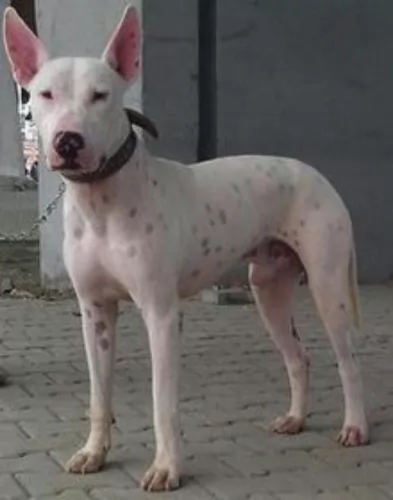 The Gull Terr hails from Pakistan. Having been introduced to the country by the British Raj, the dog has always been valued for its guarding and fighting abilities.
The Gull Terr hails from Pakistan. Having been introduced to the country by the British Raj, the dog has always been valued for its guarding and fighting abilities.
The British army, on bringing English Bull Terriers with them, mated them with local dogs. The dog was in other words, created from the old bull terrier which became extinct, and the Bully Kutta.
The Gull Terr or Pakistani Bull Terrier as he is known is a rare breed of dog. Today they are usually found in rural areas of Pakistan as well as in the Indian Panjab area, becoming popular as both pet and watchdog. It is no longer used for dog fighting as this has been banned.
 Chihuahua is a state in the country of Mexico. From this state, the dog breed Chihuahua and the “teacup, or toy” chihuahua take their name. Interestingly the Chihuahua Club of America maintains that “teacup” Chihuahuas do not exist and that the size differential is normal for the breed. Chihuahuas or their ancestors have been around a very long time, sadly the exact origins of the Chihuahua are lost into the pages of history, but archaeological clues such as wheeled dog toys, art, and pottery link the Chihuahua to Mexico and to the Techichi dog. The Techichi dog at the time of the Spanish Conquistadors was sold for food (not unlike we sell beef or chicken) and also as a companion dog to death. Cortez even mentioned the Techichi dog in a letter sent back to Spain, describing them as being raised for food and sold in the marketplace.
Chihuahua is a state in the country of Mexico. From this state, the dog breed Chihuahua and the “teacup, or toy” chihuahua take their name. Interestingly the Chihuahua Club of America maintains that “teacup” Chihuahuas do not exist and that the size differential is normal for the breed. Chihuahuas or their ancestors have been around a very long time, sadly the exact origins of the Chihuahua are lost into the pages of history, but archaeological clues such as wheeled dog toys, art, and pottery link the Chihuahua to Mexico and to the Techichi dog. The Techichi dog at the time of the Spanish Conquistadors was sold for food (not unlike we sell beef or chicken) and also as a companion dog to death. Cortez even mentioned the Techichi dog in a letter sent back to Spain, describing them as being raised for food and sold in the marketplace.
When a death occurred a dog was chosen as a companion and cremated with the deceased. It was believed that the dog helped the soul of the decedent reach their eternal destination. The Techichi dog from which the modern-day chihuahua likely descended was very plentiful in the central American area that is now the country of Mexico and raised by the ancient Toltecs and later the Aztec people.
Chihuahuas are little dogs and come in a variety of coats, head shapes and even (within the designation small) sizes. The designation “teacup, toy or pocket” while not an official breed name is a useful descriptor, since they are the littlest of an already small breed and these minute pets, as puppies, may fit into a teacup or a pocket.
Fortunately while no longer a food source, the chihuahua is now sought after as a loyal and lively pet and companion.
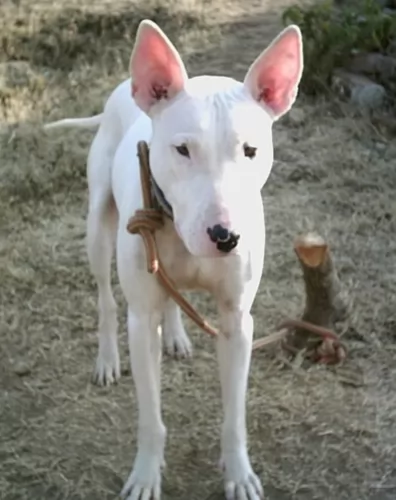 As a medium sized dog, the muscled Gull Terr stands as 45 – 66cm in height and weighs in the area of 40 – 45kg.
As a medium sized dog, the muscled Gull Terr stands as 45 – 66cm in height and weighs in the area of 40 – 45kg.
The dog has a short, smooth coat which is white, but you may find some black spots on him. He has a egg shaped head, ears are naturally erect, dark slanted eyes, and he has a long tail which is held upwards. Muscled and agile, he is a powerful working breed and makes a good watchdog.
This is an aggressive dog breed, and first-time dog owners might want to have a more amicable kind of pet to start off with.
He is a fearless dog, somewhat aggressive and suspicious towards strangers and therefore wants to protect his owner from them. With training and socialization he can be good with children in the home, although he is inclined to be boisterous and stubborn. He has fierce protective instincts, even though he is considered not as aggressive as some other Pakistani dog breeds.
The Gull Terr will need an experienced dog handler. Even though he has been a fighter in his day, he is capable of being an excellent family pet as well. You won't have trouble training him as he is intelligent. He then becomes more obedient and more manageable. He is a very active dog and therefore he won't fit into city dwelling where there are small spaces. He needs a place to run and on top of that he will require a good deal of exercise.
 Chihuahuas are small. Even the bigger ones are only about six pounds and a “teacup” or “toy” is often three pounds or less. Their bodies are slightly longer than they are tall, but even the tallest are not over nine inches. Chihuahua standing under five inches in height is not uncommon in the “teacup” or smallest of these dogs. They have two different head types and a domed skull. One type of head shape is like a deer while the other is described as an apple-shaped head. The apple-shaped heads are more popular than the deer shaped heads, although sometimes in the “teacup” especially the soft spot fails to close at maturity when growth is complete and the bones should knit, therefore leaving a soft spot in their skull – this is called a molera.
Chihuahuas are small. Even the bigger ones are only about six pounds and a “teacup” or “toy” is often three pounds or less. Their bodies are slightly longer than they are tall, but even the tallest are not over nine inches. Chihuahua standing under five inches in height is not uncommon in the “teacup” or smallest of these dogs. They have two different head types and a domed skull. One type of head shape is like a deer while the other is described as an apple-shaped head. The apple-shaped heads are more popular than the deer shaped heads, although sometimes in the “teacup” especially the soft spot fails to close at maturity when growth is complete and the bones should knit, therefore leaving a soft spot in their skull – this is called a molera.
Like different shaped heads chihuahua may have long hair or short-haired coats. The short-haired coats are smooth. The Chihuahua coats may be a large variety of colors ranging from black to white, with red, brown, fawn, cream and chocolate and they may be solid-colored, spotted or sabled. Personal preference is the determining factor on the type of coat a pet Chihuahua has since the breed does not have a preferred color, pattern, hair length or feel. Their muzzle (nose/mouth combination) is short and pointed. Chihuahua have have naturally erect pointed ears and large round eyes. A Chihuahuas tail is relatively long and mostly either curled up and over the back or carried up.
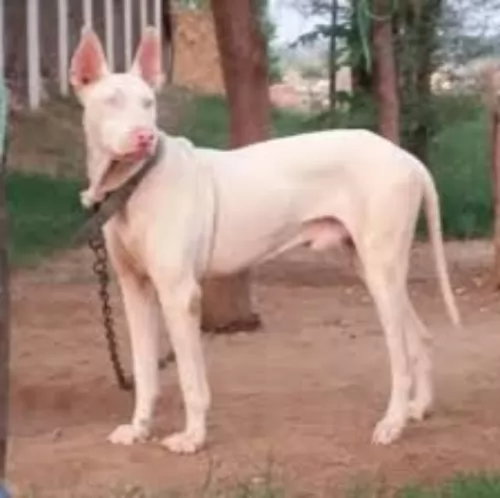 Your Gull Terr love the attention he receives from his human family and he won’t flourish at all if he is put into the back yard for watch dog purposes only. He is a dog that needs to come indoors to be with his family.
Your Gull Terr love the attention he receives from his human family and he won’t flourish at all if he is put into the back yard for watch dog purposes only. He is a dog that needs to come indoors to be with his family.
He tends to be somewhat aggressive and this is why he isn’t looked upon as the ideal pet for first-time dog owners and those with young children in the home.
He is a confrontational dog, willing to enter into a fight with provocation. Strong willed he will require early training and socialization, and when he is brought up by a firm, consistent, kind owner, he can get over his aggression and become a loyal, devoted, protective and loving pet.
 Children friendliness very interactive with family but has been known to nip at small children and bark, so no not really
Children friendliness very interactive with family but has been known to nip at small children and bark, so no not really
3. Adaptability yes but they are better off in apartments and homes not out in the country where their size makes them targets for predators.
4. Learning ability average ability to learn but Chihuahua can be but stubborn which may impact ability and willingness to learn.
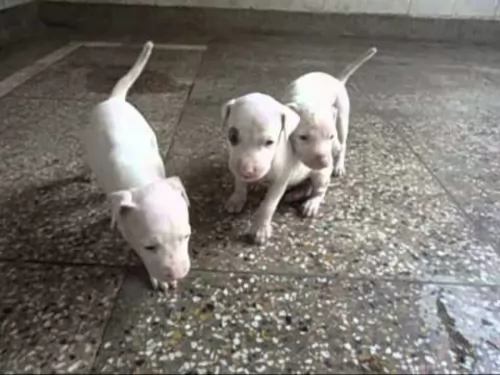 The Gull Terr has a deep chest and this means he is more prone to bloat, a condition known as gastric dilation volvulus.
The Gull Terr has a deep chest and this means he is more prone to bloat, a condition known as gastric dilation volvulus.
Your pet's stomach fills with air and this leads to decreased blood flow to vital organs. The stomach can twist and this is when the condition becomes life threatening as blood supply to the stomach is cut off. Instead of feeding him large meals, feed him smaller meals more frequently.
Deafness in your pet can be temporary or permanent, in one ear or both. There are are so many reasons why your pet could be deaf and it could be a birth defect, an infection or old age. Certain dogs such as the white coated Gull Terr are also more predisposed to congenital deafness.
Get him to the vet who will examine your dog’s ear canal for wax and debris and discuss the way to go for your beloved pet.
 Chihuahuas live on average fourteen to eighteen years. There are some issues that may cause concern or lower life expectancy.]
Chihuahuas live on average fourteen to eighteen years. There are some issues that may cause concern or lower life expectancy.]
• Hypoglycemia (low blood sugar) is something to watch for. Low blood sugar can cause death in just a few hours but when caught is very easily treated. Some of the symptoms are being uncoordinated when walking, acting sleepy or lethargic, unfocused sight, fainting, having a seizure or having spasms in the muscles of the neck. First aid can right this condition with a sweet supplement like corn syrup, or honey. This is more common in puppies, but the teacup chihuahuas are susceptible.
• Hydrocephalus (water on the brain) can affect many toy dog breeds. The puppy or dog will appear to have an oversized head, and be slow (display lethargy) and grow slower than its littermates.
• Pulmonic stenosis (a heart condition) occurs when the right ventricle is impeded. Teacup Chihuahuas are also susceptible to heart murmurs.
• Collapsed trachea this occurs when the cartilaginous rings in a Chihuahua do not form completely or weaken. This can be hereditary or an acquired condition and occurs in other small breeds of dog.
• Molera – where after finishing growth a soft spot remains in the skull and the bones do not knit. As a puppy, the owner must remain vigilant about head injuries.
• Obesity (overweight). Most of the time this is a result of the Teacup Chihuahua being overfed. Obesity can contribute to a shortened lifespan and chronic bronchitis.
• Cold susceptibility. Cold weather can cause Teacup Chihuahuas to shiver or tremble when exposed and during cold temperatures, the dogs may need to wear a sweater and boots outside and cuddle with their owners under blankets or bask in the sun to stay warm.
• Infected or injured eyes. Due to the prominent eyes, exposure to irritants such as dust, allergens, or dry air can cause the dog to develop this beginning with watering eyes.
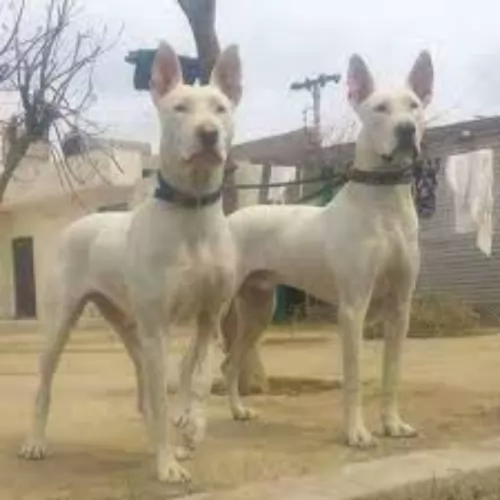 Easy to look after with his short coat, the Gull Terr will only require a brushing twice a week to keep the coat shiny and healthy.
Easy to look after with his short coat, the Gull Terr will only require a brushing twice a week to keep the coat shiny and healthy.
Because his coat is white, it can show dirt easily, and it will simply require taking a damp cloth and wiping the mark off him. You don't want to be bathing him often as this dries his skin out – rather just wipe the coat down.
Your Gull Terr is a highly energetic dog and he loves nothing more than to be involved in robust exercise and games. He is best suited in a home with large grounds and if you do opt to have him in the city, you will have to pay close attention to his exercise needs – lots of walks, runs, ball games, swimming and running with you as you cycle.
You want to be sure that your energetic Gull Terr has a healthy diet full of important proteins, fats, and carbohydrates.
Protein is always important for a dog like this and you want to make absolutely sure that apart from his high quality kibble, you mix in raw meat from time to time as well as cooked chicken, fish, brown rice and vegetables.
When looking for a commercially manufactured dog food, look for high-quality animal protein as a top ingredient. Make sure he always has fresh, cool water available to him.
 1. Feeding the Puppies. Puppies should be fed four times a day. Underfeeding can cause the issues of low blood sugar and overfeeding can result in obesity increasing the risk of other health complications.
1. Feeding the Puppies. Puppies should be fed four times a day. Underfeeding can cause the issues of low blood sugar and overfeeding can result in obesity increasing the risk of other health complications.
2. Feeding the Adult. Adult teacups are also vulnerable to hypoglycemia and obesity. Of course, the low blood sugar will be much more acute than obesity and need prompt care if it occurs. Adult teacups should be fed twice a day.
3. Points for Good Health. The chihuahua generally exhibits more vigor and endurance than pet owners expect from such a small breed of dog.
4. Games and Exercise for Teacup Chihuahua. Go ahead and run and play but remember even with the unexpected stamina and endurance this is a very small dog, small legs, using discernment, judgment, and restraint so the games and exercise is fun and builds health and is a special bonding time, without jeopardizing the sugar levels or causing exhaustion or misery.